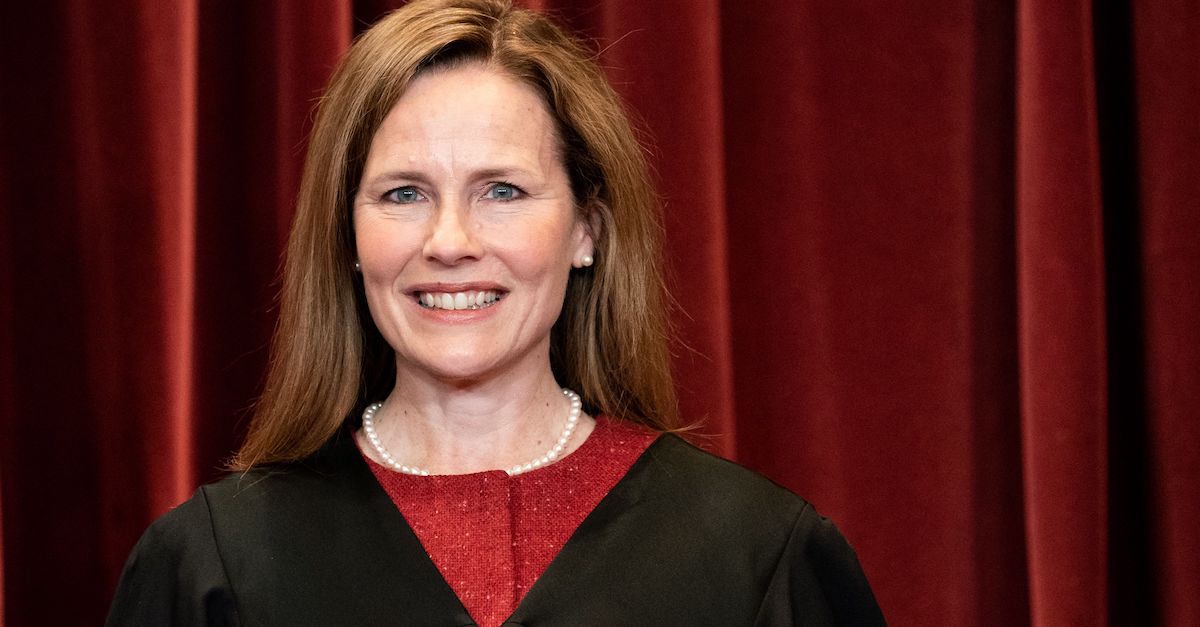
Associate Justice Amy Coney Barrett stands during a group photo of the Justices at the Supreme Court in Washington, DC on April 23, 2021.
Democrats criticized Justice Amy Coney Barrett over her decision not to recuse herself from a case that the Supreme Court heard on Monday morning involving a conservative group who financially supported her confirmation last year.
“Justice Barrett is ignoring important ethical standards to rule on a case that could open our democracy to further infiltration by dark-money influence, perhaps permanently,” Sen. Sheldon Whitehouse (D-R.I.) told Forbes. “Her choice to press forward in spite of recusal laws also creates a troubling new precedent, and undermines public confidence in the integrity of the Court.”
The nation’s high court heard oral arguments in two consolidated cases stylized as Americans for Prosperity Foundation v. Rodriquez and Thomas More Law Center v. Bonta on Monday morning. The companion cases both concern First Amendment challenges to a California law which requires some opaque nonprofit groups to divulge certain donor information to the IRS.
The lead petitioner in the case is a nonprofit run by billionaires David Koch and Charles Koch. During Barrett’s relatively painless confirmation process, the group spent in excess of $1 million on ads boosting her image.
A September 2020 article in The Hill describes that barrage:
Americans for Prosperity, the conservative advocacy group backed by billionaire mega-donor Charles Koch, recently launched ads to urge senators to confirm Barrett. The spots are running in Alabama, Alaska, Arizona, Colorado, Georgia, Iowa, Maine, North Carolina, South Carolina, Utah and West Virginia.
The group would not specify how much it plans to spend on Barrett’s confirmation battle, only saying it would be in the seven figures. In 2018, it launched a seven-figure effort for Kavanaugh’s confirmation.
Casey Mattox, Americans for Prosperity vice president for legal and judicial strategy, said the organization has already led more than 100,000 letters and calls to senators since Saturday, the day President Trump announced Barrett as his nominee to fill the seat left vacant by the death of Justice Ruth Bader Ginsburg on Sept. 18.
The extent of the advertising money spent for and against Barrett’s confirmation–never seriously in doubt and on a relative glide path compared to the previous fight over Justice Brett Kavanaugh’s razor-thin win in the U.S. Senate–ultimately exceeded the Kavanaugh advertising war by millions of dollars.
According to Forbes, the Koch-funded group’s case being ruled on by Barrett was “especially troubling” to Whitehouse’s office because their challenge to California’s law was pending before the court at the time the recently-minted justice was being considered for a lifetime seat on the highest judicial bench in the land.
“Statute, constitutional case law, and common sense all would seem to require your recusal from [the case],” Whitehouse, Sen. Richard Blumenthal (D-Conn.) and Rep. Hank Johnson (D-Ga.) wrote in an open letter last week. “At a minimum, there should be a public explanation as to why you think recusal is not required under federal law, since your participation in the case on these facts would appear to both conflict with 28 U.S.C. § 455 and effectively overturn [relevant case law]. Understanding this determination will also aid Congress in its ongoing consideration of judicial ethics and transparency rules.”
“The American people are alarmed about the seemingly dominant influence of special interests on our politics and government,” the trio of Democrats continued. “And the [Koch-funded group’s] operation’s ‘full scale campaign’ for your confirmation makes plain that our judiciary is a target of this massive influence apparatus. Now, in AFPF, the Court takes up an important case that squarely implicates the power of big special interests to exercise their influence from behind veils of secrecy.”
“We hope you will consider seriously and address publicly the question of recusal in this case,” that letter concluded.
That hope went unaddressed.
[image via ERIN SCHAFF/POOL/AFP via Getty Images]